#Austen
Explore tagged Tumblr posts
Text
And then, 168 years later, someone like physicist Alma Zook does astronomy about it to see if you got it right:
As an example, I would like to examine the one explicitly astronomical reference in all of her novels, which occurs in Mansfield Park. Her reporting of the evening sky during this incident is sufficiently accurate and detailed that one may determine, to a fair degree of precision, the orientation of the drawing room at Mansfield Park in which this conversation takes place. (...) —and Miss Austen gets it right, in striking contrast to some of her less careful colleagues, such as Charlotte Brontë. (The behavior of the moon in Jane Eyre is, well—"remarkable" is the polite word.)*
*Zook, Alma C. “Star-Gazing at Mansfield Park.” Persuasion 8 (1986): 29–33.
Do not write fanfiction. One second you're normal and the next you're downloading a calendar from 2004 and tearing your hair out over what specific date every event in your fic happens
12K notes
·
View notes
Text

Jane Austen was born in 1775, so this year marks her 250th birthday (in fact on the 16th December, but I'm doing while the weather is tolerable). So I decided to do what I've often said I would do and take a walk around the villages where she grew up (with Nevis of course - he's a big Austen fan).












According to the leaflet I had, the first church there is St Mary's, where her brother was curate (I was sure it was called something else - maybe some of the names have changed over the years, or I'm remembering wrongly. I could find out but I'm too tired right now). At the end is Deane House I'm pretty sure, home to the Harwood family in her time, so just before that would be Deane Church where her father had been rector in 1773.

Not sure those would have been there in Jane's time. But anyway, in Steventon itself, this phone box has been refurbished as a book exchange:







'Steventon's most famous resident was arguably Jane Austen'. I would say definitely. But maybe I don't know local history as much as I should. Maybe at one time this was the arts capitol of the world.
Anyway obviously there was more. Steventon Rectory where she was born was demolished, and a new rectory built later by her brother after her death. But it was getting pretty late in the afternoon by this point.

2K notes
·
View notes
Text
I think it's just laziness. A lot of aspects of Austen have been flanderized over the years to fit with common tropes in adaptations and discourse and to make her books more romantic, in multiple senses of the word. The older, physically unappealing(/outright repulsive) man who the heroine fears she'll have to resort to for security is such a well-known figure that he easily inserts himself into the character.
It ties into the way nobody will laugh at Elizabeth even when the narrative is being ironic. She has to be a proper heroine by our standards and that means perfection.
honestly i think a lot of nuance to Mr. Collin's character is lost in most P&P adaptations when they cast him as a guy multiple decades older than his book age. this man is twenty-five years old and fresh out of seminary. he does things like apologize for fifteen minutes straight and start conversations in socially inappropriate ways he's not a Creepy Older Relative he's the guy who went to college and now thinks he knows shit but also somehow learned almost nothing there and is probably actually a lot more anxious than he lets on. casting him as an older guy gives a vastly different impression of what he's like
512 notes
·
View notes
Text


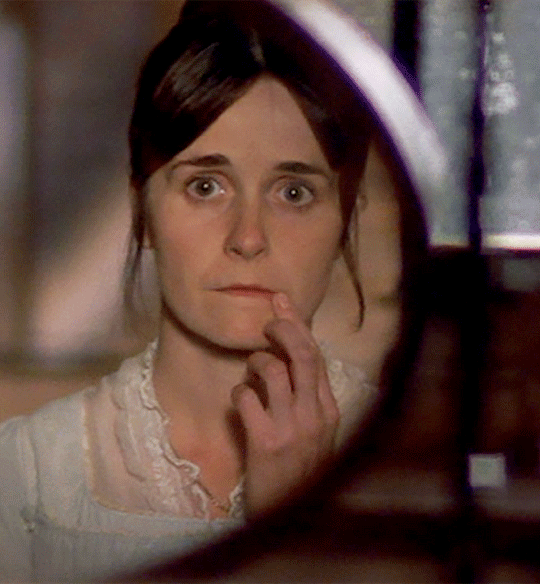


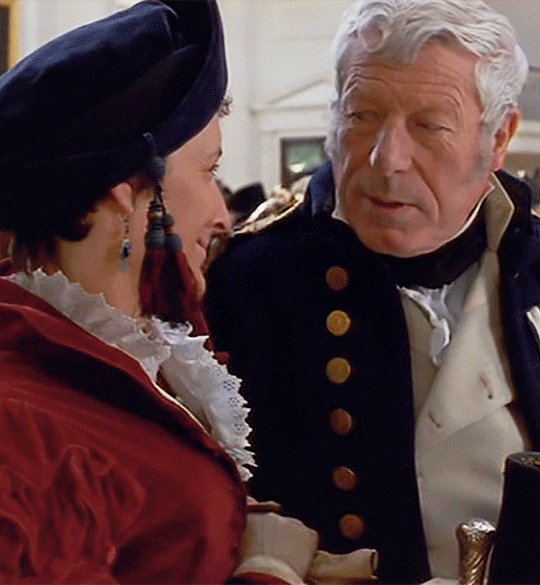
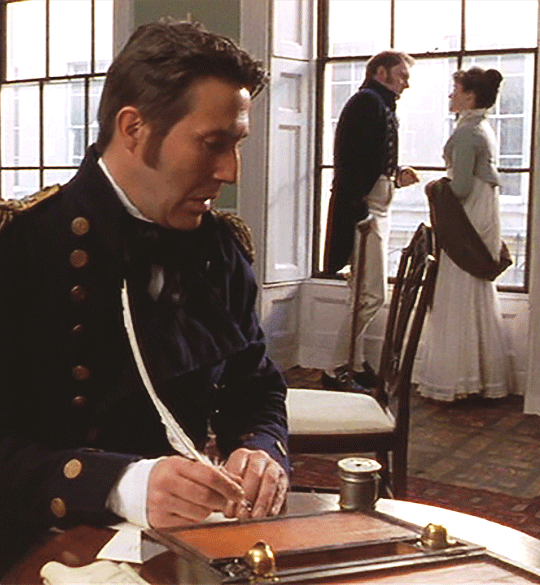

persuasion (1995) dir. roger michell
#persuasion#persuasion 1995#persuasionedit#austenedit#perioddramaedit#filmedit#*userbolt#gif: misc#austen#the persuasion renaissance is NOW we out here romanticizing this film!!!!!!!!#GOD my kingdom for a version over 480p though#notes#1k
2K notes
·
View notes
Text
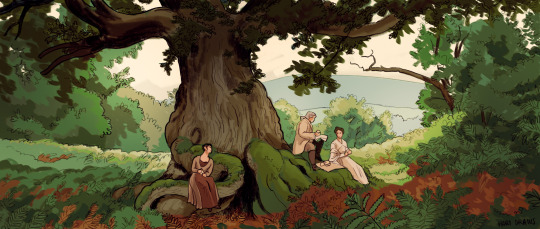
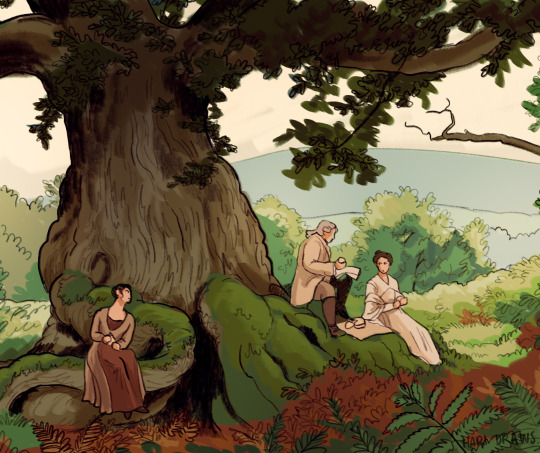
Fanart of the really good tree from Pride and Prejudice (2005)
#my favourite character tbh#pride and prejudice#pride & prejudice#austen#period drama#comics development#art#fanart#misc fanart
2K notes
·
View notes
Text
Perhaps this question has been posed before, but it’s been on my mind since the TV adaptation of bridgerton came out: one of the central conflicts of that show centers around the idea that gentry women can’t be around men unchaperoned. The show/source material are partially inspired by Jane Austen and regency aesthetics, but when i think about Pride and Prejudice there are many pivotal scenes where Elizabeth is alone with men and it’s not treated as scandalous. From my reading, the scandal usually stems from actual implications of seduction, ie; the way wickham absconds with much younger girls.
This isn’t to say the period didn’t have strict social rules, but the social rules in bridgerton have always seemed more Victorian/Edwardian to me than regency. I don’t know if those vibes are accurate or just my assumptions. When Elizabeth is alone with Darcy at the Collins’ or at the inn in Lambton, as far as I can remember there’s no real comment on the propriety of the situation. I don’t know if this is an actual reflection of what was appropriate during the time or if Austen is bending the rules for her narrative.
150 notes
·
View notes
Text
I was rereading the correspondence included in Pride and Prejudice, and I'm always amused by the "Yours, etc." used at the end of several of the letters simply because it was too much work to write it out the sign off in full. But what really gets me is that Mr. Collins letter to Mr. Bennet at Lydia's elopement is the only one to end with:
"I am, dear sir," etc., etc.
Like Austen is physically tapping you on the shoulder, going: "look, I'm not going to write out any of these commonplace civilities, but I do need you to know that Mr. Collins uses much much more of them"
#pride and prejudice#jane austen#austen#sunfreckle's scribbles#there is one other double 'etc.' in the novel#to indicate that Bingley is Very Very Civil and profuse in regretting that he has to decline an invitation to dinner#and that he'd love to come at any other time#because apparantly there are no people so verbose as a bingley in love and a collins keeping up a correspondence
461 notes
·
View notes
Note
Listen once I said that Emma and Frank are the same and got slaughtered on this website but they ARE that's the POINT OF HIM they're both charming, gregarious, witty in a way that leads to cruelty (although it seems more studied for Frank whereas Emma tends to get carried away), they're both widely beloved due to being good-looking and amiable. And because of all these things they are both capable of manipulating other people and ruining their lives carelessly and thoughtlessly without facing any consequences. Frank is who Emma could be, she could abandon her father, she could hurt other people on purpose, but Emma's not actually cruel. She's thoughtless and stubborn and elitist and she does have a mean streak, but when all's said and done she has good intentions and truly cares for people. And she has a backbone! She tries to make up with Jane multiple times and accepts it when it's clear Jane won't be friends with her - that takes a courage which Frank, who takes out his frustration that he can't marry Jane ON Jane, doesn't show. Frank exists to indicate both the danger Emma's in if she follows her behaviour down, but also indicates to the reader that Emma, despite being annoying at times, isn't actually terrible. She's worth having as a heroine. Austen said no one will like Emma but MYSELF, she liked Emma! She knew Emma deserved to have a story! Frank is her way of saying look there's good here! That's what I think he's doing in the narrative.
Framing this and putting it in the front of my copy of Emma for real
98 notes
·
View notes
Text
"she really has causing problems disease" -- my dear friend @pythagoriantymek is enjoying Emma the novel and having correct opinions about Emma the character.
#Austen#Emma woodhouse#Emma#Other highlights from his review include:#Mr Knightley is savage (true)#Mr woodhouse is so funny - number 1 gruel fan
78 notes
·
View notes
Text
"And sometimes I have kept my feelings to myself because I could find no language to describe them in."
-Jane Austen
#poets cafe#life#poems on tumblr#poem#poetsclub#poets on tumblr#poets corner#poetry#spilled ink#spilled thoughts#spilled emotions#spilled poetry#spilled writing#spilled heart#spilled feelings#spilled prose#spilled words#literature blog#literature#literate rp#literary quotes#writer stuff#writers and poets#writerscommunity#writeblr#Jane#jane austen#austen
54 notes
·
View notes
Text

#jane austen#austen#christmas#christmas special#holidays#books#reading#literature#television#tv#wronghands#john atkinson#webcomic#humor
78 notes
·
View notes
Text

When Mr. Charles Bingley rode into Hertfordshire to acquaint himself with Netherfield Park it was on a purely accidental recommendation. The solicitor who took it upon himself to advocate for Netherfield could certainly not be blamed for seeing a very desirable tenant in him. Bingley was at that time not yet two years of age, and unmarried, but he had the sort of good-humoured and generous character that must recommend him to almost anybody. The same could not be said for his closest friend…
Conceit and Conciliation is a full, canon compliant retelling of Jane Austen’s “Pride and Prejudice”, told from the perspectives of Fitzwilliam Darcy and Charles Bingley.
It was written with a lot of love and a lot of help from my sister, and you can download it right now for free (ePub, Mobi or PDF) on my website laurasimons.com!
#conceit and conciliation#austen#jane austen#austen fanfic#laura drabbles#it is such a relief to have this out into the world <3#pride and prejudice#writers on tumblr#regency#regency romance#mr darcy#mr bingley
177 notes
·
View notes
Text
The fact that captain Wentworth's letter, you know, THE letter captures exactly what Anne has been feeling throughout the book... He's kinda flirting with the Miss. Musgroves- agony but he notices she's in pain - hope; he is taking a pre breakfast walk with Louisa but a few moments later looks at her as if remembering the old her; he seems heartbroken over Louisa's fall but praises Anne as the most suitable one to nurse her; Louisa is marrying someone else but is he okay or does he feel betrayed... Ahh, the poetry of it alll
#persuasion#jane austen#austen#novels#novel#captain wentworth#Anne#I'm half agony half hope#he is half agony half hope but I'm all tears#books
114 notes
·
View notes
Text
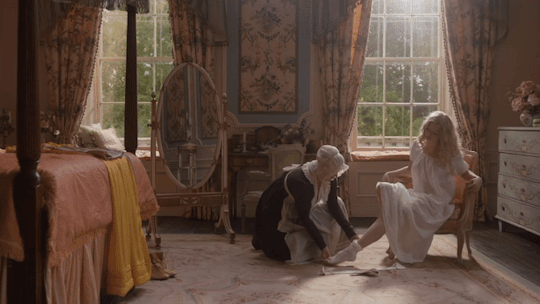
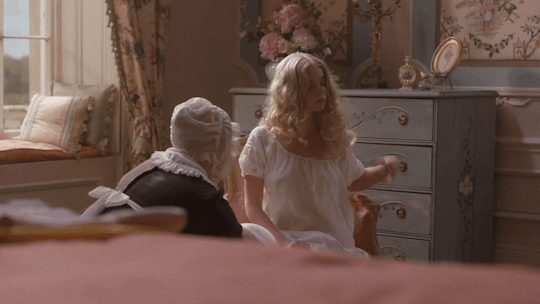
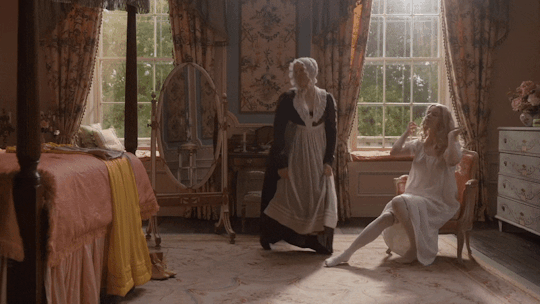
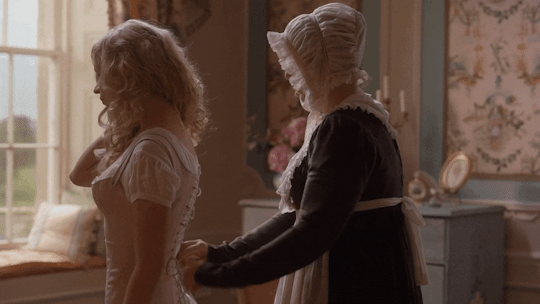
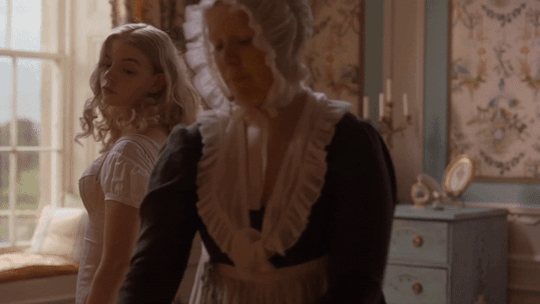
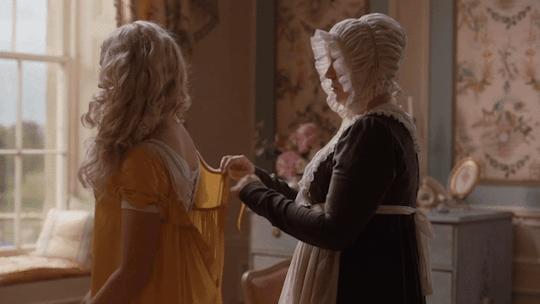
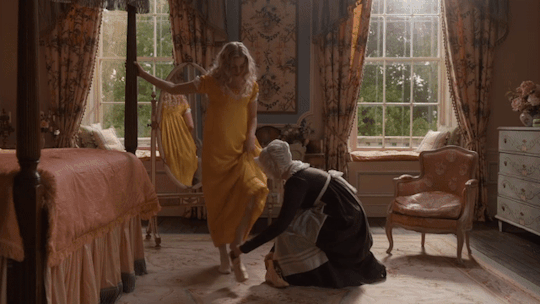



Anya Taylor-Joy in a deleted scene of Emma. (2020)
#anya taylor joy#anya taylor-joy#emma.#jane austen#austen#autumn de wilde#emma woodhouse#period drama#period film#regency era#movie#movies#film#movie gifs#film gifs#gif set#getting ready#costume#beautiful people#beautiful women#beautiful#actress#deleted scene#1800s#book to film#book adaptation
403 notes
·
View notes
Text
When it comes to adaptations of Pride & Prejudice, especially modernised versions, it's always quite clear that Jane Austen is a lot harsher towards Lydia Bennet than we are generally comfortable with nowadays. She's barely sixteen and yet is held fully responsible for all of her actions and thereby deserving of how she ends up (with Wickham).
But there's something else that I think is integral to Lydia's character and her treatment in the narrative: she is not sorry and she is not miserable. And while her gleeful "Lydia was Lydia still" attitude just after she got married could be just another piece of evidence that she's simply too unprincipled to feel any sort of shame, all the information we get about her future implies that she pretty much stays that way:
Whenever [Lydia and Wickham] changed their quarters, either Jane or [Elizabeth] were sure of being applied to for some little assistance towards discharging their bills. Their manner of living, even when the restoration of peace dismissed them to a home, was unsettled in the extreme. They were always moving from place to place in quest of a cheap situation, and always spending more than they ought. His affection for her soon sunk into indifference: hers lasted a little longer; and, in spite of her youth and her manners, she retained all the claims to reputation which her marriage had given her. Though Darcy could never receive him at Pemberley, yet, for Elizabeth’s sake, he assisted him further in his profession. Lydia was occasionally a visitor there, when her husband was gone to enjoy himself in London or Bath; and with the Bingleys they both of them frequently stayed so long, that even Bingley’s good-humour was overcome, and he proceeded so far as to talk of giving them a hint to be gone.
It is very likely Lydia does not enjoy being poor, but she has no qualms about asking her sisters for money. And while I presume Wickham isn't faithful to her (especially not when "enjoying himself" in London or Bath), it says in the text that her affection for him only lasts "a little longer" than his for her.
It is remarked upon that Wickham and Lydia's characters "suffered no revolution from the marriage of her sisters" and, although she is always refused, she keeps trying to get Kitty to visit her with the promise of balls and young men.
Compare this to how Maria Betram's future is sketched at the end of Mansfield Park:
It ended in Mrs. Norris’s resolving to quit Mansfield and devote herself to her unfortunate Maria, and in an establishment being formed for them in another country, remote and private, where, shut up together with little society, on one side no affection, on the other no judgment, it may be reasonably supposed that their tempers became their mutual punishment.
No such promise of punishment for Lydia! If she really stays "Lydia still; untamed, unabashed, wild, noisy, and fearless", perhaps she is allowed to skip through her unsatisfactory marriage with the same energy she skipped into it: flirting left and right, spending all her money, and thinking only of her own enjoyment.
Which is probably the kindest ending the story can give her, considering she insisted on marrying Wickham.
#austen#lydia bennet#jane austen#pride and prejudice#don't mind me I am stuck in bed and unable to read anything unfamiliar
123 notes
·
View notes